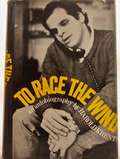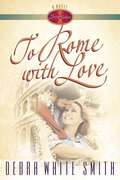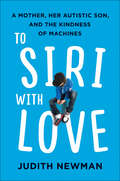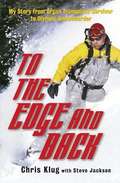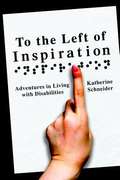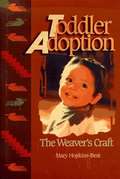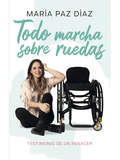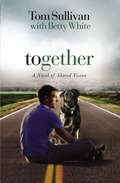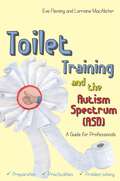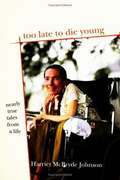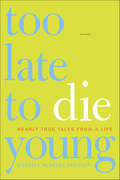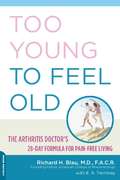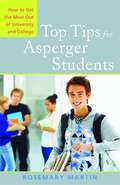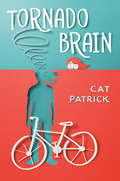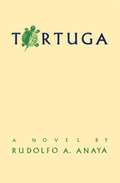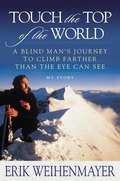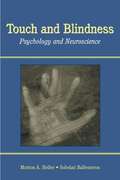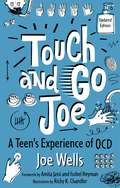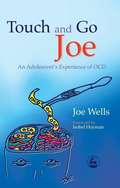- Table View
- List View
To Guide and Guard
by Alexandra HasluckRelates the early history of the guide dog movement in Australia, the beginning ideas, the challenges, pitfalls, and successes.
To Race the Wind
by Harold KrentsThe autobiography of Harold Krents, a young blind man who was a well-known lawyer in the early 1970's. Harold was the inspiration for the film and play, Butterflies Are Free.
To Ride the Public's Buses: The Fight That Built a Movement
by Barrett Shaw Mary JohnsonHow could you go to school, or go on a date, or volunteer somewhere if the only trips deemed worth funding for you were medical trips? How could you get a job if you could only get three rides a week? If you were never on time? How could you raise a family, shop for food, get your kids to and from school or wherever, if all the rides were taken up with work trips (and this for a population with a 70% unemployment rate)? Most of all, you heard the oppressive, overbearing message that other people -- from the transit authority CEOs and systems managers down to the drivers -- could decide better than you -- and would decide -- what it was most worthwhile for you to be doing. You simply did not count. . . . Who could forget Edith Harris's death grip on a bus windshield wiper? Cathy Thomas and George Cooper throwing "blood" stained money at the Dallas transit board of directors? Mickey Rodriguez's gentle, giant frame quietly refusing to move? Mark Ball's and Bob and Renate Conrad's political raps? George Florum and Mel Conrardy showing neophytes like myself how you block a San Antonio bus? Dana Jackson's chant of "Can you hear us, on the inside?" echoing off the walls of the Los Angeles County Jail at midnight? In DC, the Preacher intoning "We will be back again, and again, and again ..." as the crowd drank it in? Jim Lundville's silent smile as he "wandered out" in front of a Phoenix bus? . . .
To Rome With Love (Seven Sisters Series Book #4)
by Debra White SmithMelissa gazed into velvet brown eyes. Kinkaide hadn't changed much in six years. His expressive eyes and vibrant smile brought back memories and images of a time filled with promise and love... at time she thought would last forever. Melissa stepped back. Nothing could break through the barriers surrounding her heart...nothing (note the..."nothing" And now Kinkaide was standing before her, believing she had accepted his invitation for a Mediterranean excursion. He held out a note signed with her name...a note she had never seen before. Shock slowly softened to interest. Despite his broken promises, hope stirred. What if... A captivating tale of romance and suspense
To Siri with Love: A Mother, Her Autistic Son, and the Kindness of Machines
by Judith NewmanA NEW YORK TIMES NOTABLE BOOK OF 2017From the author of the viral New York Times op-ed column "To Siri with Love" comes a collection of touching, hilarious, and illuminating stories about life with a thirteen-year-old boy with autism that hold insights and revelations for us all.When Judith Newman shared the story of how Apple’s electronic personal assistant, Siri, helped Gus, her son who has autism, she received widespread media attention and an outpouring of affection from readers around the world. Basking in the afterglow of media attention, Gus told anyone who would listen, "I’m a movie star."Judith’s story of her son and his bond with Siri was an unusual tribute to technology. While many worry that our electronic gadgets are dumbing us down, she revealed how they can give voice to others, including children with autism like Gus—a boy who has trouble looking people in the eye, hops when he’s happy, and connects with inanimate objects on an empathetic level.To Siri with Love is a collection of funny, poignant, and uplifting stories about living with an extraordinary child who has helped a parent see and experience the world differently. From the charming (Gus weeping with sympathy over the buses that would lie unused while the bus drivers were on strike) to the painful (paying $22,000 for a behaviorist in Manhattan to teach Gus to use a urinal) to the humorous (Gus’s insistence on getting naked during all meals, whether at home or not, because he does not want to get his clothes dirty) to the profound (how an automated "assistant" helped a boy learn how to communicate with the rest of the world), the stories in To Siri with Love open our eyes to the magic and challenges of a life beyond the ordinary.
To the Edge and Back: My Story from Organ Transplant Survivor to Olympic Snowboarder
by Steve Jackson Chris KlugStory of Chris Klug, Olympic snowboarder. His life, dreams, and organ transplant survival.
To the Left of Inspiration: Adventures in Living with Disabilities
by Katherine SchneiderWhen is the last time you've read an honest, funny book about living with disabilities? To the Left of Inspiration: Adventures in Living with Disabilities is just such a book. You'll learn from a woman blind from birth about activities of daily life, like talking to children about disabilities, traveling, going to church, and working. Great memoirs about amazing people with disabilities exist, as do hundreds of books about the diagnosis and treatment of a particular disability. There are also books for specialists about teaching, rehabilitating, or accommodating a particular kind of disability. Since the passage of the Americans with Disabilities Act, more and more people interact daily with students, customers, and clients with disabilities and want to do so knowledgeably and sensitively. The life experiences Schneider describes to exemplify her suggestions to the reader highlight the warmth and humor in all of our struggles to be humane with each other, whether we are temporarily able-bodied or disabled. Fifty-four million Americans have chronic illnesses or disabilities requiring them to make accommodations in the ways they live their lives. They have families, friends, coworkers, teachers, health care professionals, and church leaders who want to know what their disabled friend is going through and how to help. Schneider writes about living with blindness for over fifty years and fibromyalgia for ten years.
Todas las palabras que no me han dicho
by Veronique PoulainFresca, intimista e infinitamente cómica, Todas las palabras que no me han dicho es la nueva novela revelación en Francia, donde ha vendido más de 50.000 ejemplares. Ser adolescente no es nada fácil, y menos aún si, como Véronique, se vive con un padre y una madre un tanto especiales, que no puede comunicarse como el resto del mundo. Fuera de las paredes de su casa, la gente cuenta historias, se enfada, ríe y ama. Los padres de Véronique también hacen todo esto, pero con las manos: son sordomudos. Las pequeñas anécdotas e historias familiares son tan irreverentes como reflexivas, tan sencillas como profundas, tan singulares como cercanas a nuestras experiencias. De lo que podría haber sido un drama, Véronique Poulain hace una comedia: un libro único sobre una familia que también lo es. La crítica ha dicho...«Una pequeña joya.»Femme Actuelle «Divertido, cruel y conmovedor.»OuestFrance «Una magnífica declaración de amor filial.»Libération
Todas las palabras que no me han dicho
by Veronique PoulainFresca, intimista e infinitamente cómica, Todas las palabras que no me han dicho es la nueva novela revelación en Francia, donde ha vendido más de 50.000 ejemplares. Ser adolescente no es nada fácil, y menos aún si, como Véronique, se vive con un padre y una madre un tanto especiales, que no puede comunicarse como el resto del mundo. Fuera de las paredes de su casa, la gente cuenta historias, se enfada, ríe y ama. Los padres de Véronique también hacen todo esto, pero con las manos: son sordomudos. Las pequeñas anécdotas e historias familiares son tan irreverentes como reflexivas, tan sencillas como profundas, tan singulares como cercanas a nuestras experiencias. De lo que podría haber sido un drama, Véronique Poulain hace una comedia: un libro único sobre una familia que también lo es. La crítica ha dicho...«Una pequeña joya.»Femme Actuelle «Divertido, cruel y conmovedor.»OuestFrance «Una magnífica declaración de amor filial.»Libération
Toddler Adoption: The Weaver's Craft
by Mary Hopkins-BestAdvice for parents and others involved with international or domestic adoption of a toddler with or without other special needs.
Todo marcha sobre ruedas: Testimonio de un renacer
by María Paz DíazTestimonio de superación de la ex tenista paralímpica y modelo María Paz Díaz. A los dieciocho años, cuando regresaba de una fiesta, María Paz Díaz recibió un impacto de bala a la altura de la cintura que dañó parte de su médula espinal. El autor del disparo fue un gendarme que portaba su arma de servicio. «¿Por qué lo hizo?» es la gran pregunta que ella y sus familiares se hicieron, y que hasta el día de hoy se mantiene sin respuesta. Esa misma noche, y mientras luchaba por mantenerse con vida en el hospital de Talca, Marita supo que no volvería a caminar. Pese al dolor y a la impotencia, pese a las innumerables dificultades y sinsabores que tuvo que enfrentar, esta mujer, que ahora tiene 31 años, no se rindió y luchó cada día por tener una existencia luminosa y cumplir sus sueños. Con esfuerzo y tenacidad recobró su independencia, fue tenista paralímpica, modelo sobre ruedas y logró viajar por el mundo recogiendo experiencias. Ahora, a trece años de su accidente, ha decidido contar toda su verdad en este libro.
Together: A Story of Shared Vision
by Tom Sullivan Betty WhiteFrom the book "If this dog loves me enough to lay down his life for my survival, how can I just give up?" One misstep on a mountain climbing trip plunged Brenden McCarthy into darkness by stealing his sight and everything else he held dear. But a too-independent guide dog named Nelson just might lead him back to life . . . if they don't kick him out of guide dog school first. Brenden can't accept the fact that he's lost his sight. And Nelson can't accept that he's been paired with someone other than his former master. Just as Brenden starts to live again, a devastating setback causes him to try to end it all. Brenden releases Nelson and sits down in the middle of an intersection. At that moment, everything changes when Nelson freely decides he'd rather join Brenden in death than live without him. Now they need a leap of faith and a love beyond words to make it.
Toilet Training and the Autism Spectrum (ASD): A Guide for Professionals
by Lorraine Macalister Penny Dobson Eve FlemingThis practical guide equips practitioners to support families and carers in developing effective toilet training programmes and provide continued help with analysing and addressing problems that occur. With appropriate intervention and persistence most children on the autism spectrum can be toilet trained, however difficult it may sometimes seem at first. Eve Fleming and Lorraine MacAlister are specialists on continence problems in autism and have packed their expertise into this accessible guide. Focusing on the 3 'Ps' - preparation, practicalities and problem-solving - they offer a step-by-step process tailored for children with autism, which includes strategies for managing behavioural issues, approaches to address sensory sensitivities and advice on overcoming specific bowel and bladder difficulties. It also has an invaluable chapter on approaching toilet training with children with PDA. This book will give early years practitioners, special education teachers, paediatric and school nurses, health visitors and other frontline professionals the knowledge and skills to support children with autism spectrum disorder and their families with toilet training.
Tone Deaf
by Olivia RiversHis world is music. Her world is silent.Ali Collins was a child prodigy destined to become one of the greatest musicians of the twenty-first century-until she was diagnosed with a life-changing brain tumor. Now, at seventeen, Ali lives in a soundless world where she gets by with American Sign Language and lip-reading. She’s a constant disappointment to her father, a retired cop fighting his own demons, and the bruises are getting harder to hide.When Ali accidentally wins a backstage tour with the chart-topping band Tone Deaf, she’s swept back into the world of music. Jace Beckett, the nineteen-year-old lead singer of the band, has a reputation. He’s a jerk and a player, and Ali wants nothing to do with him. But there’s more to Jace than the tabloids let on. When Jace notices Ali’s bruises and offers to help her escape to New York, Ali can’t turn down the chance at freedom and a fresh start. Soon she’s traveling cross-country, hidden away in Jace’s RV as the band finishes their nationwide tour. With the help of Jace, Ali sets out to reboot her life and rediscover the music she once loved.
Too Late to Die Young: Nearly True Tales From a Life
by Harriet Mcbryde JohnsonHarriet McBryde Johnson isn't sure, but she thinks one of her earliest memories was learning that she will die. The message came from a maudlin TV commercial for the Muscular Dystrophy Association that featured a boy who looked a lot like her. Then as now, Johnson tended to draw her own conclusions. In secret, she carried the knowledge of her mortality with her and tried to sort out what it meant. By the time she realized she wasn't literally a dying child, she was living a grown-up life characterized by intense engagement with people, politics, work, struggle, and community, and also by a deep appreciation for the ephemeral beauty of life. Due to a congenital neuromuscular disease, Johnson has never been able to walk, dress, or bathe without assistance. With help, however, she lives life on her own terms, from the streets of Havana, where she covers an international disability rights conference, to the floor of the Democratic National Convention in Chicago, to an auditorium in Princeton, where she defends the value of lives like hers against philosopher Peter Singer. Her idea of fun leads her (as a law student) to take on the Secret Service during a presidential visit, as well as to undertake a last-minute campaign for local political office and to set the world endurance record for telethon protesting. And she may be the thinnest of all the thin women who have been photographed for the cover of The New York Times Magazine. Too Late to Die Young opens with a lyrical mediation on death and ends with a tough sermon on pleasure. In between, we get the tales Johnson most enjoys telling from her own life. This is not a book "about disability" but it will surprise anyone who has ever imagined that life with a severe disability is inherently worse than another kind of life. As disarmingly bold, funny, and unsentimental as Johnson herself, Too Late to Die Young marks the arrival of an unforgettable American voice.
Too Late to Die Young: Nearly True Tales from a Life
by Harriet McBryde JohnsonWith a voice as disarmingly bold, funny, and unsentimental as its author, a thoroughly unconventional memoir that shatters the myth of the tragic disabled lifeHarriet McBryde Johnson isn't sure, but she thinks one of her earliest memories was learning that she will die. The message came from a maudlin TV commercial for the Muscular Dystrophy Association that featured a boy who looked a lot like her. Then as now, Johnson tended to draw her own conclusions. In secret, she carried the knowledge of her mortality with her and tried to sort out what it meant. By the time she realized she wasn't a dying child, she was living a grown-up life, intensely engaged with people, politics, work, struggle, and community.Due to a congenital neuromuscular disease, Johnson has never been able to walk, dress, or bathe without assistance. With help, however, she manages to take on the world. From the streets of Havana, where she covers an international disability rights conference, to the floor of the Democratic National Convention in Chicago, to an auditorium at Princeton, where she defends her right to live against philosopher Peter Singer, she lives a life on her own terms. And along the way, she defies and debunks every popular assumption about disability. This unconventional memoir opens with a lyrical meditation on death and ends with a surprising sermon on pleasure. In between, we get the tales Johnson most enjoys telling from her own life. This is not a book "about disability" but it will surprise anyone who has ever imagined that life with a severe disability is inherently worse than another kind of life.
Too Young to Feel Old: The Arthritis Doctor's 28-Day Formula for Pain-Free Living
by Richard Blau E. A. TremblayNearly 43 million Americans suffer with joint pain, and that pain dominates their lives. But even the oldest among us are far too young to feel this way and, in fact, you don't need to live like this. <P><P>In Too Young to Feel Old, leading rheumatologist Dr. Richard Blau shows you what you can do to get instant relief. With a straightforward Arthritis Doctor's Questionnaire that simulates a visit to a rheumatologist's office, you can determine the severity of your condition. From there, you will be able to personalize a 28-day program to help you reduce inflammation, maintain your range of motion, and decrease arthritic pain through one of the newest, most effective approaches known to modern science. The 28-day program provides you with: A four-week menu plan with nearly 100 delicious recipes that not only reduce common arthritis symptoms but also help you lose weight Step-by-step illustrations guiding you through simple exercises that reduce joint pain and stiffness, strengthen muscles, and improve flexibility and endurance A rundown of the latest breakthroughs in arthritis research, common treatments, and little-known alternative therapies Everything you need to know about sizing up arthritis doctors, from finding the right one to knowing what you should ask to get the information you need Whether you are aching with osteoarthritis or suffering with the inflammation and swelling of rheumatoid arthritis, Too Young to Feel Old can help you break out of a cycle of pain and into a life that is pain free.
Toothpaste and Railroad Tracks
by Kenneth JerniganThis is the eighth book in the Kernel Books Series--a series of books in which people who are blind tell about life situations and how they coped with them. "What do toothpaste and railroad tracks have in common? Just about the same that axes and law books do--nothing and everything. They are the building blocks of the routine of daily existence. In a very real sense they are the essence of humanity itself. When I was younger (maybe 40 years ago), there was a popular song called "Little Things Mean a Lot." It dealt with what the title implies, but its message was much more than that. It was that each little incident (relatively unimportant in and of itself) combines with all of the other trivial events that are constantly happening to us to form the pattern of our lives. It is not the major events but the recurring details that make us what we are--that determine whether we will succeed or fail, be happy and productive or sad and miserable. Other books in this series are available from Bookshare."
Top Tips for Asperger Students
by Rosemary MartinLeaving home and moving to college or university can be a daunting experience. In this easy-to-use book, Rosemary Martin provides guidelines and invaluable advice for every student on the Autism Spectrum as he or she thinks about, and plans for, entry into student life. Packed with tried and tested methods for coping and succeeding away from home that cover every aspect of student life, this book focuses on the particular needs of people with AS - from how to get up on time for lectures, to the art of living with other people and attending to the basics of personal hygiene - and encourages everyone to make the most of student life in a style that suits them. Handy hints and tips reassure the reader that going to college is a big deal for every student, regardless of whether or not they are on the autism spectrum. This friendly and useful book is an absolute must for any student on the spectrum about to begin a university or college degree.
Tornado Brain
by Cat PatrickIn this heartfelt and powerfully affecting coming of age story, a neurodivergent 7th grader is determined to find her missing best friend before it's too late.Things never seem to go as easily for thirteen-year-old Frankie as they do for her sister, Tess. Unlike Tess, Frankie is neurodivergent. In her case, that means she can't stand to be touched, loud noises bother her, she's easily distracted, she hates changes in her routine, and she has to go see a therapist while other kids get to hang out at the beach. It also means Frankie has trouble making friends. She did have one--Colette--but they're not friends anymore. It's complicated.Then, just weeks before the end of seventh grade, Colette unexpectedly shows up at Frankie's door. The next morning, Colette vanishes. Now, after losing Colette yet again, Frankie's convinced that her former best friend left clues behind that only she can decipher, so she persuades her reluctant sister to help her unravel the mystery of Colette's disappearance before it's too late.A powerful story of friendship, sisters, and forgiveness, Tornado Brain is an achingly honest portrait of a young girl trying to find space to be herself.
Tortuga
by Rudolfo AnayaSet in a hospital for crippled children, this novel explores the meaning of pain and suffering. Tortuga, meaning turtle, is a young boy who is paralyzed and is hospitalized. He nevertheless finds the courage to outdo pain and tragedy.
Touch The Top Of The World: A Blind Man's Journey To Climb Farther Than The Eye Can See
by Erik WeihenmayerThe incredible, inspiring story of world-class climber Erik Weihenmayer, from the terrible diagnosis that foretold of the loss of his eyesight, to his dream to climb mountains, and finally his quest to reach each of the Seven Summits. Erik Weihenmayer was born with retinoscheses, a degenerative eye disorder that would progressively unravel his retinas. Erik learned from doctors that he was destined to lose his sight by age thirteen. Yet from early on, he was determined to rise above this devastating disability and lead a fulfilling, exciting life. In Touch the Top of the World, Erik recalls his struggle to push past the limits placed on him by his visual impairment--and by a seeing world. He speaks movingly of the role his family played in his battle to break through the barriers of blindness: the mother who prayed for the miracle that would restore her son's sight; the father who encouraged him to strive for that unreachable mountaintop. Erik was the first blind man to summit McKinley. Soon he became the first blind person to scale the infamous 3000-foot rock wall of El Capitan and then Argentina's Aconcagua, the highest peak outside of Asia. He was married to his longtime sweetheart at 13,000 feet on the Shira Plateau on his way to Kilimanjaro's summit, and recently Erik scaled Polar Circus, the 30,000-foot vertical ice wall in Alberta, Canada. Erik's story is about having the vision to dream big; the courage to reach for near impossible goals; and the grit, determination, and ingenuity to transform our lives into "something miraculous. "To download an audio excerpt from Touch the Top of the World, visit the American Foundation for the Blind Web site.
Touch and Blindness: Psychology and Neuroscience
by Morton A. Heller Soledad BallesterosThis is a scholarly document concerning the neurological aspects of visual impairment.
Touch and Go Joe, Updated Edition: A Teen's Experience of OCD
by Joe WellsIn this down-to-earth, fun and empowering book, Joe Wells talks about his teenage experience of OCD and all the coping mechanisms and treatment options that have worked for him. It's packed full of brilliant, honest advice for others struggling with this disorder, written by someone who understands what it's like to be a teen with OCD. This updated edition with all-new illustrations includes a brand-new chapter written 16 years later, detailing how Joe overcame his disorder and is now a successful comedian.
Touch and Go Joe: An Adolescent's Experience of OCD
by Joe WellsPart of the Reading Well scheme. 35 books selected by young people and health professionals to provide 13 to 18 year olds with high-quality support, information and advice about common mental health issues and related conditions. As many as 2 in every 100 people suffer from Obsessive-Compulsive Disorder (OCD), and 16-year-old Joe Wells is one of them. In Touch and Go Joe, he tells the story of his battle with OCD from its insidious beginnings at age 9 and increasingly intrusive symptoms, to diagnosis at age 12. Having struggled to keep the condition a secret for years, he is now able to talk and write openly about OCD and how he battled to overcome it. This book is packed with advice and coping strategies, as well as first-hand accounts of available treatments such as cognitive behavioural therapy and medication. Written in an informal and accessible style, and including his own humorous illustrations, Touch and Go Joe gives an upbeat yet realistic look at the effect of OCD on adolescent life. This honest and amusing account will raise awareness of this all-too-common, yet frequently misdiagnosed disorder and will be of interest to anyone who has suffered from or knows someone who has suffered from OCD, including children and adolescents, teachers, psychologists, psychiatrists, mental health professionals, parents and carers.

